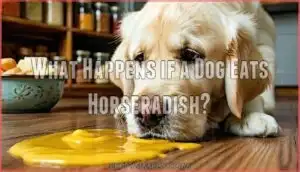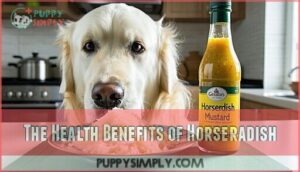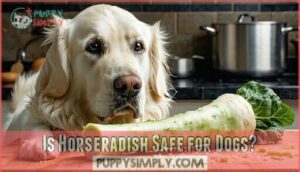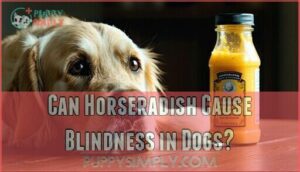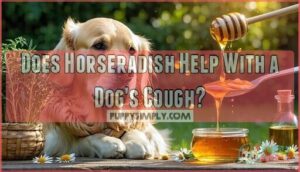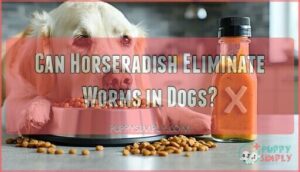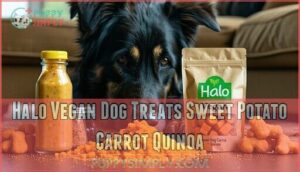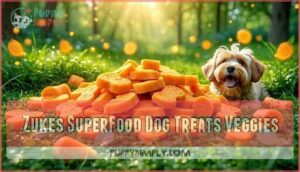This site is supported by our readers. We may earn a commission, at no cost to you, if you purchase through links.
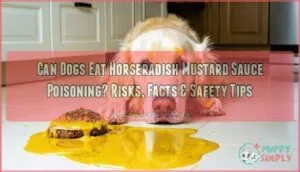
The compounds in horseradish that give it that eye-watering kick can irritate your dog’s digestive system and potentially cause more serious complications. While horseradish mustard sauce poisoning isn’t typically fatal, it’s certainly not worth the risk.
If your dog accidentally snags some from your sandwich, monitor them closely for signs of distress. The good news? Most dogs recover quickly with proper care, but understanding the specific symptoms and treatment options can make all the difference.
Table Of Contents
- Key Takeaways
- Can Dogs Eat Horseradish Mustard Sauce?
- What Happens if a Dog Eats Horseradish?
- Will Eating Horseradish Kill My Dog?
- The Health Benefits of Horseradish
- Is Horseradish Safe for Dogs?
- What Should Dogs Avoid Eating?
- What to Do if a Dog Accidentally Eats Horseradish?
- Can Horseradish Cause Blindness in Dogs?
- Does Horseradish Help With a Dog’s Cough?
- Can Horseradish Eliminate Worms in Dogs?
- Wholesome Pride Sweet Potato Chews
- Halo Vegan Dog Treats Sweet Potato Carrot Quinoa
- Zukes SuperFood Dog Treats Veggies
- Frequently Asked Questions (FAQs)
- Does horseradish poison dogs?
- Is mustard poisonous to dogs?
- What happens if a dog eats mustard?
- Are mustard greens safe for dogs?
- Can dogs eat mustard seeds?
- Is mustard good for dogs?
- Can dogs eat plain Horseradish?
- Can dogs eat Horseradish root?
- Can dogs eat food with garlic and Horseradish?
- Can dogs eat horseradish mustard?
- Conclusion
Key Takeaways
- Don’t feed your dog horseradish mustard sauce – it contains spicy compounds that’ll irritate their digestive system and cause vomiting, diarrhea, and stomach pain.
- It won’t kill your dog, but it’ll make them miserable – while horseradish mustard sauce poisoning isn’t fatal, your pup will experience uncomfortable gastrointestinal upset for 24-48 hours.
- Monitor your dog closely if they accidentally eat some – watch for symptoms like excessive drooling, vomiting, diarrhea, and difficulty breathing, and contact your vet if symptoms persist or worsen.
- Keep all spicy condiments away from your pet – prevention is your best strategy since dogs’ sensitive digestive systems can’t handle spicy foods the way humans can.
Can Dogs Eat Horseradish Mustard Sauce?
Looking at spicy foods like horseradish mustard sauce from the perspective of Pet Safety and Dog Nutrition, you’ll want to keep this condiment far from your furry friend. While horseradish isn’t technically toxic, it contains allyl isothiocyanate, which can trigger Food Allergies and cause serious digestive upset in dogs.
Your pup’s sensitive system simply can’t handle Spicy Foods the way humans can. Horseradish mustard sauce combines two problematic ingredients—the intense heat of horseradish with mustard’s equally harsh compounds. This combination can lead to immediate mouth and throat irritation, followed by gastrointestinal distress including bloating, gas, and diarrhea.
When considering horseradish dog safety, remember that even small amounts can cause problems. Some dogs experience excessive thirst and vomiting after consuming spicy condiments. The risk of dog food poisoning from horseradish toxicity increases with larger quantities.
For ideal Canine Health, stick to dog-appropriate treats instead. If you’re wondering "can dogs eat horseradish" in any form, the answer remains consistently no—it’s simply not worth the risk. Understanding radish nutrition facts is vital to making informed decisions about your dog’s diet and avoiding potential health issues.
What Happens if a Dog Eats Horseradish?
When your dog eats horseradish, the spicy compound allyl isothiocyanate immediately irritates their mouth, throat, and stomach lining.
Your dog’s spicy encounter with horseradish triggers immediate mouth and throat irritation.
Most dogs experience gastrointestinal upset including vomiting, diarrhea, and excessive drooling within hours of consumption.
While horseradish toxicity isn’t life-threatening, canine allergies can develop, causing facial swelling or breathing difficulties.
The intense spiciness overwhelms dog digestion systems, leading to gastro issues like bloating and abdominal pain.
Pet safety experts recommend avoiding horseradish mustard sauce poisoning by keeping all spicy foods away from curious pups.
It’s vital to understand the chemical composition effects to take proper precautions and guarantee dog safety.
Will Eating Horseradish Kill My Dog?
The good news is that horseradish won’t kill your dog. While horseradish toxicity can cause uncomfortable symptoms, it’s not fatal according to veterinary sources.
Your pup might experience gastro issues like vomiting or diarrhea, but these typically resolve with proper care.
Here’s what you should know about dog poisoning from horseradish:
- Mild symptoms – Most dogs only experience temporary digestive upset
- No fatal cases – Veterinary literature shows no documented deaths from horseradish ingestion
- Quick recovery – Symptoms usually disappear within 24-48 hours with supportive care
If you’re wondering "can dogs eat horseradish," the answer remains no due to potential canine allergies and dog mustard reactions, but it’s not among the truly dangerous dog toxic foods.
Dogs can also eat radish safe foods as a healthy alternative to horseradish.
The Health Benefits of Horseradish
While horseradish offers impressive Human Benefits like anticancer properties and Respiratory Health support, these advantages don’t translate safely to dogs.
The root contains beneficial glucosinolates with anti-inflammatory effects, plus calcium, magnesium, and vitamins A, C, and B.
However, Horseradish Nutrition benefits can’t overcome the spiciness that triggers Digestive Issues in canines.
Your dog’s sensitive system isn’t equipped to handle horseradish mustard sauce or raw horseradish without experiencing uncomfortable dog horseradish reactions.
Dogs require probiotic rich foods to support their gut health and overall well-being.
Is Horseradish Safe for Dogs?
While horseradish won’t kill your dog, Pet Safety experts warn against feeding it due to serious Digestive Issues.
The pungent compounds cause gastrointestinal irritation, leading to vomiting and diarrhea.
Food Allergies can trigger severe reactions including facial swelling and breathing difficulties.
Canine Health professionals emphasize that dogs’ sensitive digestive systems can’t handle spicy foods.
Dog Nutrition guidelines recommend avoiding horseradish entirely, as safer alternatives exist for ideal health without risking uncomfortable symptoms.
Some safer options include radishes, but be mindful of potential digestion concerns.
What Should Dogs Avoid Eating?
Beyond horseradish’s risks, many common foods pose serious threats to your dog’s health. Understanding these Toxic Ingredients helps prevent accidental dog poisoning and keeps your pet safe.
Some brands have faced scrutiny for potential health risks.
- Chocolate and caffeine – Contains theobromine that causes seizures and cardiac issues
- Grapes and raisins – Lead to kidney failure, even in small amounts
- Onions and garlic – Destroy red blood cells, causing anemia
- Xylitol (artificial sweetener) – Triggers dangerous blood sugar drops
- Alcohol and raw dough – Causes respiratory depression and metabolic acidosis
Practice Portion Control with any new foods, consider Breed Sensitivity factors, and respect Dietary Restrictions. Choose Safe Alternatives like carrots or sweet potatoes instead.
What to Do if a Dog Accidentally Eats Horseradish?
When your dog accidentally consumes horseradish, swift action helps prevent complications. Monitor symptoms closely for vomiting, diarrhea, and excessive drooling. Offer fresh water for hydration support to flush irritants from their mouth and system.
Maintaining optimal nutrition for dogs is also vital for their overall well-being.
| Immediate Actions | When to Seek Help |
|---|---|
| Provide fresh water | Persistent vomiting |
| Monitor symptoms | Difficulty breathing |
| Remove remaining horseradish | Severe lethargy |
| Consider bland diet | Facial swelling |
Contact your veterinarian if dog poisoning symptoms worsen or persist beyond a few hours. Veterinary advice ensures proper treatment for dog digestive issues and prevents serious dog health risks.
Implementing preventative measures like securing spicy condiments protects your pet’s future pet safety.
Can Horseradish Cause Blindness in Dogs?
Despite widespread blindness rumors, horseradish doesn’t cause vision loss in dogs.
No scientific evidence supports claims linking horseradish to dog blindness.
While allergic reactions can occur, they typically involve digestive issues rather than ocular damage.
Toxicity levels remain low, with symptoms limited to gastrointestinal upset.
However, some fermented foods, like plain fermented cabbage, can be a safer alternative.
- Myth debunked: No documented cases exist of horseradish causing permanent vision damage in dogs
- Real risks: Allergic reactions manifest as vomiting, diarrhea, and oral irritation—not blindness
- Safe alternatives: Choose dog-approved vegetables like carrots or sweet potatoes instead of risky human foods
Does Horseradish Help With a Dog’s Cough?
Your dog’s persistent cough won’t find relief through horseradish-based cough remedies.
Scientific evidence doesn’t support horseradish for canine respiratory health, and veterinary alternatives prove safer and more effective.
The isothiocyanates in horseradish can actually irritate your dog’s respiratory tract, potentially worsening symptoms rather than providing respiratory relief.
Instead, consult your veterinarian about proven safe treatments like honey or licorice root tea for dog cough management and ideal dog respiratory health outcomes.
For anxious dogs, chamomile offers soothing effects.
Can Horseradish Eliminate Worms in Dogs?
Many pet owners wonder if natural remedies can tackle dog worms, but horseradish won’t eliminate intestinal parasites.
Scientific evidence shows no veterinary deworming benefits from horseradish, and it may cause gastrointestinal irritation instead.
Knowing that environmental transmission is common, maintaining a clean living space is essential to prevent reinfection.
Consider these proven worming alternatives:
- Veterinary-prescribed medications like fenbendazole for targeted parasite prevention
- Natural remedies such as pumpkin seeds containing cucurbitacin compounds
- Regular fecal testing to monitor your dog’s parasite status effectively
Professional veterinary deworming remains the gold standard for horseradish efficacy concerns.
Wholesome Pride Sweet Potato Chews
Instead of risky foods like horseradish or mustard sauce that can cause poisoning in dogs, Wholesome Pride Sweet Potato Chews offer safe nutrition.
These single-ingredient treats provide excellent chew nutritional value with vitamins A and C plus fiber. Ingredient sourcing matters—these come from USA-grown sweet potatoes without toxic additives.
Chew size matters for dental health, helping clean teeth naturally. Many owners also use VOHC approved chews for their dog’s dental health.
Unlike harmful toxic foods, these Alternative Brands keep dogs healthy while satisfying their chewing instincts safely.
Halo Vegan Dog Treats Sweet Potato Carrot Quinoa
You’ll find peace of mind knowing that vegan dog treats like Halo’s Sweet Potato Carrot Quinoa blend offer a safe alternative when you’re concerned about dogs consuming harmful foods like horseradish mustard sauce.
These plant-based alternative dog treats contain beneficial ingredients your pup can actually digest without poisoning risks.
Sweet potato benefits include natural fiber and vitamins, while the carrot quinoa mix provides protein-sensitive options for dogs with food allergies.
This Halo treat review highlights their grain-free formula that’s free from corn, wheat, soy, and artificial preservatives that might trigger digestive upset.
Unlike spicy condiments that can cause gastrointestinal distress, these sustainably-sourced treats use chickpeas and vegetables your dog’s system can handle.
Many owners find that vegan treats improve their dog’s breath, offering an added benefit.
The low-calorie formula makes them perfect for training sessions without overwhelming your pet’s digestive tract.
You won’t worry about emergency vet visits when you choose treats specifically formulated for canine nutrition and safety.
Zukes SuperFood Dog Treats Veggies
When choosing safe alternatives to horseradish for your dog, Zuke’s SuperFood Dog Treats offer nutritional benefits without toxic dog foods risks.
These treat ingredients include antioxidant-rich pumpkin, carrots, and sweet potatoes—supporting dog health naturally. Feeding guidelines recommend these low-fat treats for training or rewards.
Unlike risky human foods that cause canine food poisoning, this brand comparison shows superior dog food safety. For a convenient option, consider Zuke’s Mini Naturals with real chicken and essential vitamins.
Most dog preferences favor these wholesome flavors over spicy condiments that trigger dog poisoning symptoms.
Frequently Asked Questions (FAQs)
Does horseradish poison dogs?
Horseradish doesn’t poison dogs, but it’ll cause gastrointestinal irritation, vomiting, and diarrhea.
The spicy compounds irritate their sensitive digestive systems, potentially triggering allergic reactions or burns in severe cases requiring veterinary attention.
Is mustard poisonous to dogs?
Most mustard varieties aren’t poisonous to dogs, but they’ll cause gastrointestinal upset, vomiting, and diarrhea.
You shouldn’t feed your dog mustard—it’s too spicy and offers no nutritional benefits for their sensitive digestive system.
What happens if a dog eats mustard?
Your pup’s digestive system wasn’t designed for spicy adventures! If your dog eats mustard, expect gastrointestinal upset including vomiting, diarrhea, and excessive thirst from the irritating compounds.
Are mustard greens safe for dogs?
Yes, you can safely feed your dog mustard greens in moderation.
These leafy vegetables provide vitamins A, C, and K, plus fiber for digestive health.
However, introduce them gradually and avoid seasoning to prevent stomach upset.
Can dogs eat mustard seeds?
Skip the seeds, skip the trouble. Mustard seeds contain compounds that’ll irritate your dog’s digestive system, causing vomiting, diarrhea, and stomach upset. Choose safer treats instead.
Is mustard good for dogs?
No, mustard isn’t good for dogs. You’ll want to avoid giving your furry friend any mustard products, as they can cause stomach upset, vomiting, and diarrhea in sensitive pups.
Can dogs eat plain Horseradish?
Plain horseradish isn’t recommended for your dog. It’ll irritate their mouth, throat, and digestive system, potentially causing vomiting, diarrhea, and stomach upset. Choose safer vegetable alternatives instead.
Can dogs eat Horseradish root?
Don’t bite off more than you can chew with horseradish root – it’s not safe for your dog.
The spicy compound allyl isothiocyanate causes gastrointestinal irritation, vomiting, and diarrhea in dogs.
Can dogs eat food with garlic and Horseradish?
No, don’t feed your dog food containing garlic and horseradish.
Garlic is toxic to dogs and can cause serious health problems, while horseradish irritates their digestive system and causes gastrointestinal upset.
Can dogs eat horseradish mustard?
Like feeding fire to a delicate flower, horseradish mustard can burn your dog’s digestive system.
You shouldn’t give it to your pup—it’ll cause vomiting, diarrhea, and painful stomach irritation due to its spicy compounds.
Conclusion
Despite common misconceptions, can dogs eat horseradish mustard sauce poisoning isn’t something you should ignore.
Keep horseradish mustard sauce away from your dog to prevent gastrointestinal distress and potential complications.
While most dogs recover quickly from accidental ingestion, prevention remains your best strategy.
Monitor your pet closely if exposure occurs, and contact your veterinarian if symptoms develop, as your dog’s safety depends on keeping spicy condiments off their menu entirely.
- https://www.purina.com/articles/dog/feeding/can-dogs-eat/mustard
- https://www.dialavet.com/blog/can-dogs-eat-horseradish
- https://citizenshipper.com/blog/can-dogs-have-mustard/
- https://www.purepetfood.com/help/can-dogs-eat-radishes
- https://dogtime.com/dog-health/dog-food-dog-nutrition/97183-can-dogs-eat-horseradish-safe

